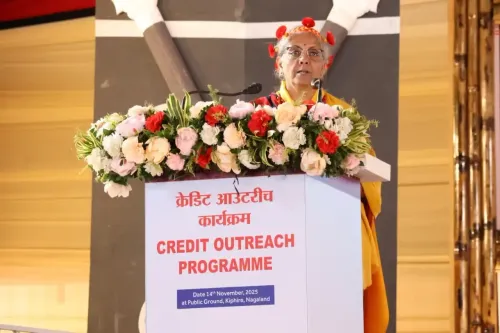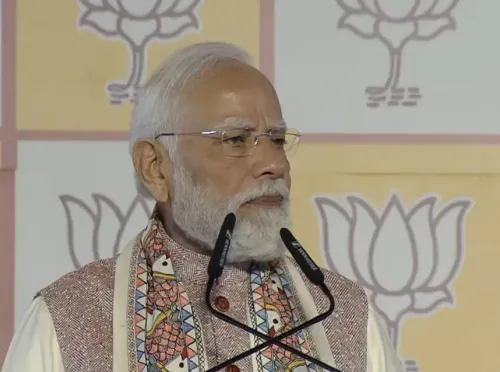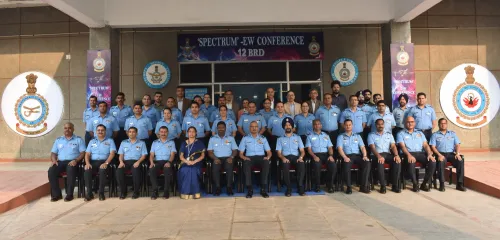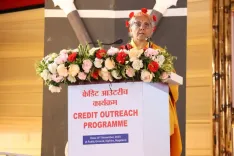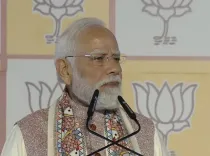Who Emerged Victorious and Who Faced Defeat? Unpacking the Power Dynamics in Bihar’s 2025 Elections
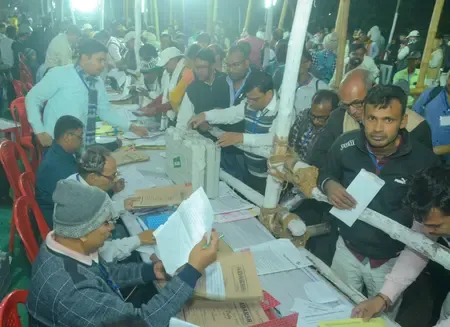
Synopsis
Key Takeaways
- NDA achieves significant victory, surpassing 200 seats.
- Nitish Kumar secures fifth term as Chief Minister.
- Chirag Paswan's Lok Janshakti Party makes a remarkable comeback.
- Tejashwi Yadav and RJD face major setbacks.
- Congress struggles to connect with voters, ending with few seats.
New Delhi, Nov 14 (NationPress) The National Democratic Alliance (NDA) is on the brink of achieving one of its most significant victories in the last twenty years as the counting for the Bihar Assembly elections progresses.
Having surpassed the 200-seat benchmark in the 243-member Assembly, the NDA has not only fortified its stance but has also eclipsed its robust performance from 2010.
Let’s delve into the key winners and losers:
Major Winners
Nitish Kumar
After nearly two decades in power, Chief Minister Nitish Kumar has adeptly navigated anti-incumbency challenges. His Janata Dal (United) is leading in over 80 seats, playing a vital role in the NDA's sweeping success.
This outcome secures Kumar a fifth term as Chief Minister and effectively halts the Opposition’s efforts—especially from Tejashwi Yadav—to craft a narrative of “youth versus experience” in Bihar.
Chirag Paswan
Among the most remarkable comebacks this election is Chirag Paswan. After securing just one seat in 2020, his Lok Janshakti Party (Ram Vilas) transformed its nearly 6% vote share into an impressive tally, winning 22 out of the 29 seats contested.
A strong consolidation of the Paswan vote, alongside Chirag's appeal to Dalits and young voters, has significantly elevated his political profile within the NDA.
Asaduddin Owaisi and AIMIM
The All India Majlis-e-Ittehadul Muslimeen (AIMIM), under the leadership of Asaduddin Owaisi, has showcased another robust performance in the Seemanchal region, where it has steadily enhanced its influence.
AIMIM won five seats—Jokihat (Araria), Kochadhaman (Kishanganj), Amour (Purnea), Bahadurganj, and Baisi (Purnea). These are the same constituencies it secured in the 2020 elections, indicating a solid grip on its support base.
HAM and RLM
Smaller NDA partners have exceeded expectations. The Hindustani Awam Morcha (HAM) of Jitan Ram Manjhi clinched five of the six seats contested, while the Rashtriya Lok Morcha (RLM) of Upendra Kushwaha led in four seats.
The strong showing of these allies was instrumental in the NDA crossing the 200-seat milestone.
Major Losers
Tejashwi’s RJD
Despite being positioned as the Opposition’s chief ministerial candidate, Tejashwi Yadav could not translate anti-incumbency sentiment into electoral victories—though he comfortably retained his Raghopur seat.
The RJD’s total of just 25 seats is a slight improvement over its 2010 performance, when it clinched only 22 seats.
After gaining momentum in 2020, the party's decline in 2025 represents a significant setback for Tejashwi’s political aspirations.
Rahul Gandhi and Congress
The Congress party again struggled to make a mark in Bihar, finishing with fewer than ten seats.
Despite Rahul Gandhi’s “Voter Adhikar Yatra”, accusations of “vote chori”, and criticism of the Special Intensive Revision (SIR) process, the party found it challenging to resonate with voters.
This outcome continues the downward trend observed in 2020, when the Congress contested 70 seats but won only 19, diminishing the Mahagathbandhan’s viability.
This time, it contested 61 seats, securing just three, and is leading in only three additional seats.
Prashant Kishor
Political strategist-turned-activist Prashant Kishor, known for assisting various parties in winning elections, finds himself among the notable losers.
Despite a two-year padyatra and considerable visibility, his Jan Suraaj initiative failed to make any electoral impact—receiving fewer votes than NOTA in numerous seats.
His development-focused message did not resonate, and his choice to abstain from contesting seats led to confusion regarding the movement’s direction.
Mukesh Sahani
Seen as a pivotal figure in the Seemanchal region, Mukesh Sahani—touted as a deputy CM candidate for the Mahagathbandhan after extensive negotiations—failed to deliver. His Vikassheel Insaan Party (VIP) could not transform caste-based mobilization into measurable gains.
The Nishad (fisherman) vote he aimed to consolidate appears to have decisively shifted towards the NDA, drawn by targeted welfare promises.

